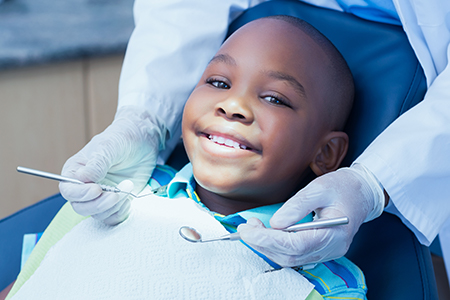
Our Office
8-10 Saddle River Road
Fair Lawn, NJ 07410
Existing Patients: (201) 797-8711
New Patients: (201) 479-0901
Visit Us Online

At the office of Stahl Dental Studio, we believe childhood is the best time to build confidence through a healthy smile. Our pediatric dentistry services focus on prevention, gentle care, and clear guidance so families can make informed choices about their child’s oral health. From the first tooth to the transition into the teenage years, we aim to be a steady partner in each developmental stage.

Healthy mouths begin with simple, consistent routines. We help parents establish age-appropriate oral care practices—how to clean newborn gums, when to introduce a toothbrush, and how to supervise brushing as a child grows. Early routines reduce the risk of decay and make future visits easier for both children and caregivers.
Preventive care is the backbone of pediatric dentistry. Regular exams and cleanings allow us to track growth, spot early signs of trouble, and apply protective measures like fluoride or sealants when appropriate. These interventions are designed to preserve primary teeth until they're ready to make way for permanent teeth.
Equally important is creating a positive, reassuring atmosphere. Our team focuses on gentle communication, calming techniques, and education that empowers children and parents alike. When a dental visit is predictable and compassionate, children develop less anxiety and more cooperative behavior over time.

A routine pediatric appointment covers more than just a quick look at the teeth. We review medical history, evaluate oral development, and examine the teeth, gums, tongue, bite, and jaw function. These regular checkups are opportunities to discuss diet, hygiene, and any concerns you or your child may have.
Diagnostic tools such as digital radiographs are used only when necessary to see beneath the surface—helping us detect cavities, assess the position of developing teeth, and monitor bone health. These images are low-exposure and used judiciously to guide care while minimizing risk.
Professional cleanings remove plaque and debris from hard-to-reach places and give our hygienists a chance to teach brushing and flossing techniques suited to your child’s age. We tailor our recommendations so that oral hygiene is effective, manageable, and becomes a normal part of daily life.
Consistent dental care prevents small problems from becoming larger ones. Cavities and infections left untreated can affect eating, speech development, school performance, and self-esteem. Early detection allows for minimally invasive treatment and a focus on long-term oral wellness.
Monitoring growth and development is another key benefit of frequent visits. Tracking how permanent teeth erupt and how jaws align makes it possible to advise on timing for orthodontic evaluations or preventive measures that can simplify later treatment.
Simple changes at home make a measurable difference. Limiting sugary snacks, avoiding sleeping with bottles containing milk or juice, and encouraging water as the primary drink can greatly reduce decay risk. We provide practical, realistic guidance parents can implement day to day.
When appropriate, we recommend protective measures—such as topical fluoride or dental sealants—to add additional layers of defense for vulnerable tooth surfaces. These treatments are quick, well-tolerated, and effective at preventing future cavities.
Begin dental visits early to normalize care and build trust.
Introduce brushing with a soft-bristled brush as teeth appear, and supervise until technique is reliable.
Avoid putting a child to bed with a bottle of anything but water to prevent prolonged sugar exposure.
Bring children for routine checkups so we can detect and address issues while they are small.
Set an example with consistent brushing and flossing—children learn by imitation.
Encourage healthy snacks and replace sugary drinks with water whenever possible.
Gently guide children away from prolonged pacifier use or thumb-sucking at the right age.
Use a properly fitted mouthguard for contact sports to reduce the risk of dental injury.

Tooth development begins well before a child’s first birthday, and the first erupted teeth deserve attention. We encourage parents to bring infants in around the time the first tooth appears or by the first birthday so we can offer guidance and make early assessments of oral health and habit formation.
Cleaning an infant’s gums and emerging teeth can be simple and safe: a clean washcloth or an infant toothbrush are often all that’s needed at first. As more teeth come in, a tiny smear of fluoride toothpaste and gentle brushing are introduced under adult supervision.
Teething discomfort is common and usually self-limiting. Safe measures—such as chilled teething rings or gentle gum massage—can provide relief. If parents notice unusual swelling, persistent fever, or feeding difficulties, we advise a prompt evaluation to rule out complications.
As children grow, their facial structure and tooth positions change rapidly. We routinely assess facial growth and jaw development so that any emerging alignment concerns are identified early. Early detection does not always mean immediate treatment, but it does allow for timely planning and referral when needed.
Orthodontic issues often become apparent by the first grade; for that reason, monitoring is crucial. When early intervention is indicated, it can reduce the complexity of later treatment and sometimes prevent more invasive procedures. We work with families to explain watchful waiting versus active steps when appropriate.
Good nutrition, consistent hygiene, and attention to harmful oral habits all support healthy growth. For children with braces or other appliances, we emphasize specialized cleaning techniques and dietary adjustments to protect brackets and wires while maintaining oral health.
Nutrition plays an essential role in oral health. Foods rich in vitamins, minerals, and protein support strong teeth and healthy gums. Replacing sticky, sugary snacks with nutrient-dense alternatives helps protect enamel and supports overall growth and energy levels.
Active play and organized sports are important for physical and social development, but they also carry a risk of dental injury. Properly fitted mouthguards absorb impact and greatly reduce the chance of chipped or knocked-out teeth. We can advise on the best type of mouthguard for your child's sport and level of play.
We recognize that accidents happen. Whether a child experiences a knocked-out tooth, a painful fracture, or sudden dental pain, timely assessment matters. Our approach emphasizes prompt, efficient care to manage discomfort and preserve dental health whenever possible.
Thank you for taking the time to learn about pediatric dentistry and how we care for growing smiles. Our goal is to provide clear, compassionate guidance so families can make confident choices for their children’s oral health. Contact us to learn more or to schedule a visit—our team is here to help.
The American Academy of Pediatric Dentistry and the American Dental Association recommend a first dental visit around the time of the first birthday or within six months of the first tooth erupting. Early visits let the dentist evaluate oral development, identify risk factors, and establish a positive relationship between your child and the dental team. Starting care early also gives parents guidance on home care, feeding practices, and preventive steps to protect emerging teeth.
At the initial appointment the dentist will perform a gentle exam and discuss your child’s oral health history, daily hygiene routines, and any concerns you have. X‑rays are typically not taken at the first visit unless there is a specific concern that warrants them. The goal of the first visit is to create a dental home where ongoing monitoring and education can support healthy development.
Before teeth appear, clean your baby’s gums with a soft, damp cloth after feedings to remove bacteria and debris. Once teeth emerge, use an age‑appropriate, soft‑bristled toothbrush and a smear or pea‑sized amount of fluoride toothpaste as recommended by your dentist or pediatrician, and supervise brushing until your child can do it effectively. Establishing consistent morning and evening routines helps reinforce healthy habits and prevents plaque buildup.
Introduce flossing when two teeth touch and continue to monitor your child’s brushing technique as they gain coordination. Avoid allowing prolonged contact with sugary liquids and replace bottles of milk or juice with water at sleep time. Regular dental visits ensure that home routines are effective and allow the dental team to provide individualized tips and corrections.
Teething can cause discomfort, drooling, and interrupted sleep for many infants as teeth erupt through the gums. Safe, nonmedicated measures such as chilled (not frozen) teething rings, a cool washcloth, or gentle gum massage with a clean finger can provide relief. Monitor for signs of excessive fever, prolonged irritability, or other unusual symptoms and contact your pediatrician or dentist if you have concerns.
Maintain regular oral cleaning even during teething so new teeth are not exposed to lingering sugars or bacteria. Offer firm foods once your child is developmentally ready to encourage chewing and soothe gums, while avoiding small, hard foods that pose a choking risk. If teething disrupts feeding or sleep patterns significantly, consult your child’s healthcare providers for tailored advice.
Cavities develop when plaque and sugars remain on the teeth, so limiting sugary drinks and foods and maintaining consistent brushing are key preventive steps. Avoid putting a baby to sleep with a bottle containing milk, formula, or juice, and consider using water for nighttime comfort to reduce prolonged sugar exposure. Encourage drinking from a cup as developmentally appropriate and clean teeth after nighttime feedings when possible.
Routine dental checkups and professional guidance reinforce home prevention and allow for early intervention when needed. Your dentist may recommend targeted preventive measures such as topical fluoride or sealants at the appropriate age based on your child’s individual risk. Education about healthy snacking, water consumption, and consistent hygiene helps reduce the likelihood of early decay.
The American Dental Association generally recommends routine dental exams and cleanings every six months, though frequency can be adjusted based on your child’s individual risk for disease. Regular visits enable the dental team to monitor growth and development, detect cavities early, and provide timely preventive care. Exams typically include a clinical assessment, professional cleaning, and age‑appropriate guidance for oral hygiene and nutrition.
At Stahl Dental Studio the recall schedule is tailored to each child’s needs, so some children may be seen more or less frequently depending on risk factors, orthodontic considerations, or medical conditions. Radiographs are taken only when indicated to evaluate tooth development and detect issues not visible during the clinical exam. Ongoing visits help establish preventive habits and reduce the chance of more extensive treatment later on.
Topical fluoride and dental sealants are preventive treatments commonly used to reduce the risk of tooth decay in children and teens. Fluoride helps strengthen enamel and can be applied in the office during routine care or used at home as advised by the dentist, while sealants are thin protective coatings placed on the chewing surfaces of permanent molars and premolars after they erupt. The dentist will evaluate each child’s decay risk and developmental stage to determine appropriate timing.
Both treatments are painless and typically completed quickly during a regular visit, and they serve as valuable adjuncts to daily brushing and a healthy diet. Your dental team will explain the expected benefits and any follow‑up recommendations so you can make informed decisions about preventive care. Regular monitoring ensures sealants remain intact and fluoride use is optimized for safety and effectiveness.
The American Association of Orthodontists recommends that children have an orthodontic screening by around age 7, when early signs of bite or jaw problems can often be identified. An early evaluation allows the dental team to monitor growth and determine whether interceptive treatment or simple observation is appropriate. Many issues can be managed more effectively when caught early, but a full course of treatment is often delayed until more permanent teeth have erupted.
If the general dentist identifies concerns such as crowding, crossbite, or significant jaw discrepancies, a referral to an orthodontic specialist will be coordinated. Early guidance can simplify later treatment and improve functional and esthetic outcomes when intervention is needed. The dentist will work with you to time any orthodontic care in a way that best supports healthy development.
Dental emergencies in children can include knocked‑out or fractured teeth, severe pain, swelling, and soft tissue injuries, and prompt attention helps preserve oral health. For traumatic injuries, gently rinse any displaced tooth or tooth fragment and keep it moist while seeking urgent dental care; the dentist will advise whether reimplantation or other measures are appropriate. For severe pain or swelling, contact your dental office so the team can assess the situation and arrange timely treatment to prevent complications.
Do not delay care when a child is in distress or when a permanent tooth has been avulsed, as rapid action can influence the prognosis. For injuries to baby teeth, avoid reimplanting a primary tooth and consult the dentist for guidance on management and monitoring. The dental team will provide clear instructions for home care and follow‑up to support healing and minimize future problems.
Many dental practices use behavior guidance techniques such as tell‑show‑do, positive reinforcement, and distraction to help children feel comfortable and cooperative during visits. Creating a child‑friendly environment, explaining procedures in simple terms, and allowing time for acclimation can reduce fear and build trust. For children with special needs or heightened anxiety, the dental team will tailor the approach and communicate with caregivers to develop a consistent plan for care.
The team at Stahl Dental Studio can discuss additional accommodations and, when appropriate, the safe use of minimal or moderate sedation to facilitate necessary treatment after a careful medical evaluation. Any decision about sedation is individualized and made with the child’s safety, development, and emotional well‑being in mind. Open communication between parents and clinicians helps ensure successful experiences and a positive attitude toward dental care.
A balanced diet rich in whole foods, calcium, and vitamins supports healthy teeth and jaw development while limiting frequent exposure to sugary and sticky snacks reduces decay risk. Encourage water as the primary drink, offer tooth‑friendly snacks like raw vegetables and cheese, and avoid prolonged sipping of sugary beverages throughout the day. Consistent routines for brushing and flossing reinforce protection against plaque and cavities as your child grows.
Habits such as prolonged pacifier use or thumb sucking can affect dental alignment if they continue beyond the preschool years, and parents should seek guidance on gentle strategies to help children transition away from these behaviors. Regular dental visits allow the dentist to monitor growth, provide targeted counseling, and recommend interventions when habits threaten oral development. Teaching children about healthy choices and modeling good habits creates a foundation for lifelong oral health.
